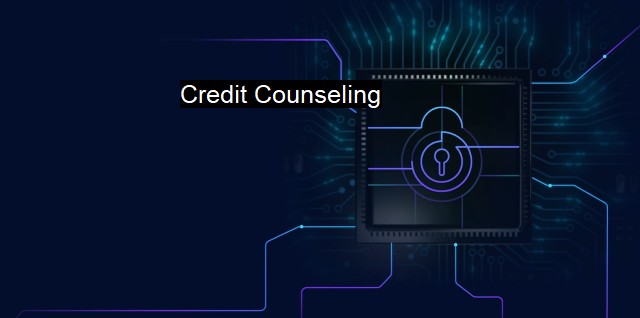What is Credit Counseling?
Credit Counseling: A Critical Tool for Personal Finance Management, Debt Relief, and Cybersecurity Risk Reduction
Credit counseling refers to a process where trained and certified counseling professionals engage with individuals to help them understand and improve their financial situation. It typically involves the assessment of an individual's financial situation, in-depth discussions concerning possible debt payoff strategies, creating budgets, and setting financial goals. It is typically provided by non-profit organizations and may potentially involve negotiating with creditors to establish manageable debt repayment schedules for customers.Credit counseling plays an integral role in painting a vivid picture of the dangers of inadequate cybersecurity systems or failure to use the recommended antivirus programs. The exponential development of digital payment systems, increase in online transactions and an exponential rise in digital borrowing, characterize today's business world. While credit counseling primarily focuses on managing finances, when dovetailed with cybersecurity, it discusses the importance of preserving data integrity.
It's not uncommon that the transition to digital platforms has led to an increase in internet fraud and cyber theft, forcing individuals and businesses to consider cybersecurity options seriously. Cybersecurity not only includes the protection of systems and networks from digital attacks but also involves safeguarding information relating to an individual's credit card details, bank accounts, and personal information. Credit frauds have significantly increased since this shift to digital platform took place.
So while credit counselors help people manage their debts effectively, they also provide information about self-protection from cyber-attacks due to vulnerabilities like weak passwords or outdated software. They explain and emphasize the significance of using antivirus programs and maintaining device operating systems up to date in defending against malware or scam attempts that could threaten one’s financial health.
Antivirus software blocks malware and other malicious viruses from entering your system. These viruses can not only destroy the device but are often designed to steal sensitive data stored on it, which may include credit information. Understanding the importance of incorporating antivirus protects one from predatory activities and reduces the risk of financial information getting into the wrong hands, an aspect reared by credit counseling agencies.
Credit counselors aptly advise on the precautions individuals must take regarding sharing sensitive financial information. Antivirus software, email filters, and pop-up blockers are key preventers of phishing schemes that trick individuals into disclosing confidential information. Regular updates of this software ensure robust protection against most recent threats posted by hackers.
Credit counseling creates awareness of real-life dangers of overspending, unrealistic budgeting, impulse buying, and failure to plan. Today, these dangers include phishing scams, ransomware attacks, Trojans designed to steal financial information, identity theft, and several types of credit card fraud. All these could negatively impact credit and severely thwart efforts of debt reduction or financial management, showing how intertwined these two components are.
A key part of credit education, in conjunction with cybersecurity, is teaching the client how to identify scams and avoid falling victim to them. Cybersecurity education forms a significant part in a society that's steadily moving towards a complete digital transformation.
Credit counseling intertwined with cybersecurity forms a formidable front to shield not only an individual’s financial health but also his personal and sensitive information from prying individuals or groups. It equips individuals with the knowledge necessary to understand and avoid financial exploitations and how to guard their personal information from being misused. The utilization of this combined service highlights credit management's importance coupled with self-protection tools and tactics, providing a well-rounded education on managing one’s finances as well as keeping their information secure.

Credit Counseling FAQs
What is credit counseling and how does it relate to cybersecurity and antivirus?
Credit counseling is a process that involves getting help from professionals to manage your finances, especially if you are in debt. While it may not directly relate to cybersecurity and antivirus, credit counseling can help you identify potential financial scams and protect yourself from fraudsters. Additionally, credit counseling can help you better manage your money and avoid having to resort to risky financial transactions.How can credit counseling services help me protect my personal information online?
Credit counseling services can teach you how to create secure passwords, recognize phishing scams, and avoid online financial fraud. Some credit counseling agencies offer educational resources on cybersecurity measures that you can take to keep your sensitive information safe from hackers and cyber criminals.Can credit counseling improve my credit score?
Yes, credit counseling can have a positive impact on your credit score. By providing you with tools and strategies to manage your finances and pay off your debts, credit counseling can help you attain financial stability, which in turn improves your credit score.Is there any downside to credit counseling services?
One potential downside to credit counseling services is that they may charge fees. Additionally, not all credit counseling services are reputable or legitimate. It is important to thoroughly research and vet any credit counseling service you plan to use to ensure that they are reputable and offer valuable services that align with your financial goals.| | A | | | B | | | C | | | D | | | E | | | F | | | G | | | H | | | I | | | J | | | K | | | L | | | M | |
| | N | | | O | | | P | | | Q | | | R | | | S | | | T | | | U | | | V | | | W | | | X | | | Y | | | Z | |
| | 1 | | | 2 | | | 3 | | | 4 | | | 7 | | | 8 | | |||||||